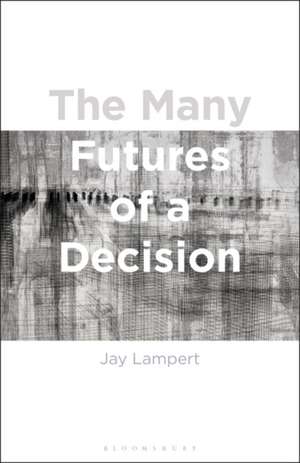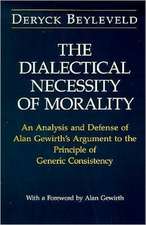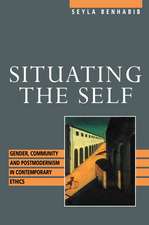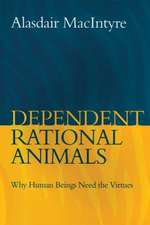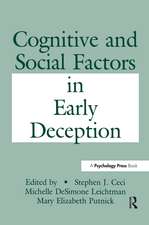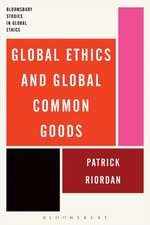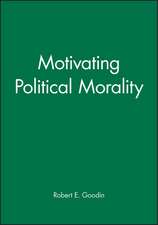The Many Futures of a Decision
Autor Associate Professor Jay Lamperten Limba Engleză Paperback – 27 iun 2018
| Toate formatele și edițiile | Preț | Express |
|---|---|---|
| Paperback (1) | 187.26 lei 3-5 săpt. | |
| Bloomsbury Publishing – 27 iun 2018 | 187.26 lei 3-5 săpt. | |
| Hardback (1) | 569.76 lei 6-8 săpt. | |
| Bloomsbury Publishing – 27 iun 2018 | 569.76 lei 6-8 săpt. |
Preț: 187.26 lei
Nou
Puncte Express: 281
Preț estimativ în valută:
35.84€ • 37.28$ • 29.59£
35.84€ • 37.28$ • 29.59£
Carte disponibilă
Livrare economică 25 martie-08 aprilie
Preluare comenzi: 021 569.72.76
Specificații
ISBN-13: 9781350047792
ISBN-10: 1350047791
Pagini: 352
Dimensiuni: 138 x 216 mm
Greutate: 0.45 kg
Editura: Bloomsbury Publishing
Colecția Bloomsbury Academic
Locul publicării:London, United Kingdom
ISBN-10: 1350047791
Pagini: 352
Dimensiuni: 138 x 216 mm
Greutate: 0.45 kg
Editura: Bloomsbury Publishing
Colecția Bloomsbury Academic
Locul publicării:London, United Kingdom
Caracteristici
combines a discussion of the concept of decision with time theory and a philosophy of the future and does it with reference to, and in a dialogue with the best minds in twentieth century continental philosophy
Notă biografică
Jay Lampert is Professor of Philosophy at Duquesne University, USA. His previous books include Simultaneity and Delay: A Dialectical Theory of Staggered Time (Continuum, 2012) and Deleuze and Guattari's Philosophy of History (Continuum, 2006).
Cuprins
Introduction to Concepts - What is the temporal referent of a decision?1. Sartre - Can a decision be binding on the future? The future without continuity2. Husserl - Decision-options and temporal overlap3. Heidegger - The original decision to decide. Continuity without a future4. Kierkegaard - Decision as promise: Decisionism in religion. Plus: Kant's moral postulate of hope and Pascal's wager of infinite time5. Schmitt - Decisionism in politics: the sovereign moment and its authoritarian follow-up6. Habermas - Steering procedures and the term limits of a decision7. Decision-Theory - Economics, seriality, and retrospective effects8. Branching Futures in Tense Logic; Possible worlds, possible futures, alternative worlds9. Derrida - Indecision-theory and the future to-come10. Deleuze - Decision in the future = XConclusion - Many overlapping real futuresBibliographyIndex
Recenzii
Lampert also includes valuable counter-points to the continental tradition by including analytic philosophy . and political thinkers from both sides of the political spectrum, such as Schmitt and Habermas. This is therefore a rich and rewarding book, as much for those interpretations as for the overall thesis.
Jay Lampert has written a provocative book on the temporality of decisions. He intertwines the book's innovative insight with a masterly and clear treatment of major continental and analytic thinkers as well as with discussions of temporal logic, decision theory, quantum physics, and the Chinese game of Go. Lampert also considers the vital implications of his thesis for ethical responsibility, especially for an age in which fundamentalisms strive to crowd out more judicious and imaginative thought. It's a must read for scholars and theoreticians working on the relation between decision and time and will be of great interest to those concerned more generally with contemporary continental philosophy.
Jay Lampert has written a provocative book on the temporality of decisions. He intertwines the book's innovative insight with a masterly and clear treatment of major continental and analytic thinkers as well as with discussions of temporal logic, decision theory, quantum physics, and the Chinese game of Go. Lampert also considers the vital implications of his thesis for ethical responsibility, especially for an age in which fundamentalisms strive to crowd out more judicious and imaginative thought. It's a must read for scholars and theoreticians working on the relation between decision and time and will be of great interest to those concerned more generally with contemporary continental philosophy.
